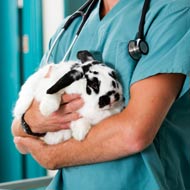
Veterinary groups urge members to sign
An official e-petition has launched calling for the title 'veterinary nurse' to be legally protected.
Created by the RCVS, the petition asks for a change in the law, ensuring that only qualified individuals who are on the RCVS register of veterinary nurses, may call themselves a veterinary nurse.
As the law stands now, anyone may use the title, even if they have no qualifications or experience and are not registered with the Royal College.
VN Council chair Liz Cox said she believes this is "unacceptable" and could result in members of the public being misled and animal health and welfare being compromised.
If the petition receives 10,000 signatures, the government will be obliged to respond. If it reaches 100,000, the issue will be considered for parliamentary debate.
Liz Cox added: "If we are successful with this campaign, the public will be assured that they are receiving the highest standard of nursing care for their animals from a genuine professional and by protecting the title we can remove any doubt about who is a veterinary nurse."
Alongside the petition, the college has put together a template letter which members of the profession and the general public can use to write to their local MP, asking them to support the campaign and adopt the Veterinary Nurse (Protection of Title) Bill, introducing it as a 10-minute rule bill or entering it into a private members' bill ballot.
Fiona Andrew, president of the BVNA, urged all members to sign the petition and write to their MP. "We believe this is an important step towards giving clarity and reassurance to the public, strengthening the profession and raising awareness of what veterinary nurses can do and enhancing animal welfare."
BVA is also supporting the campaign; president John Blackwell said protecting the title "not only recognises the skills of qualified veterinary nurses, but also gives clients confidence that their animals are receiving the highest standard of care possible."
To sign the petition, visit the government petition website: https://petition.parliament.uk/petitions/106153
You can download a template letter for your local MP here: http://www.rcvs.org.uk/registration/about-the-vn-register/protect-the-title-veterinary-nurse/



 The veterinary mental health charity Vetlife is inviting the veterinary community to join it for a sponsored cold-water dip.
The veterinary mental health charity Vetlife is inviting the veterinary community to join it for a sponsored cold-water dip.